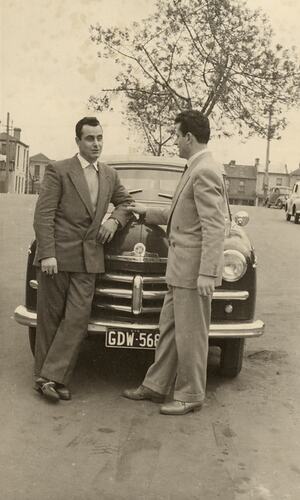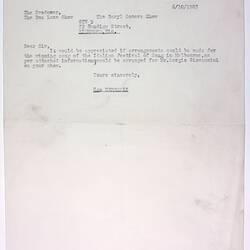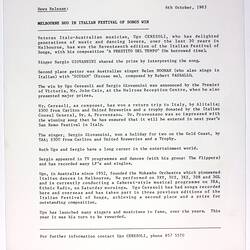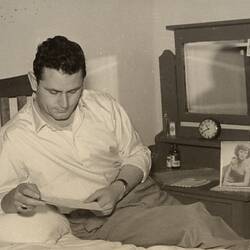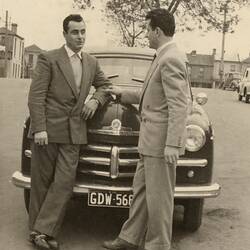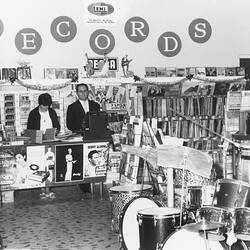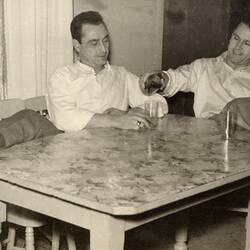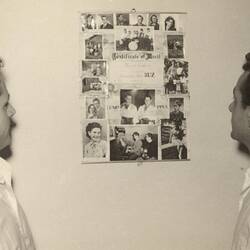Summary
Bruno (1926-1970) and Ugo Ceresoli (1927-1996) were born in the north-eastern Italian region of Emilia-Romagna, Italy. Bruno immigrated to Australia in 1949 and settled in Carlton, Melbourne. He was joined by his Ugo in 1952. In 1953 they formed the 'Mokambo Orchestra' which performed Latino-Italian music and other music styles over a period of forty years.
Bruno (b. 1926) and Ugo Ceresoli (b. 1927) were born into a Roman Catholic family in the north-eastern Italian region of Emilia-Romagna, an area considered the 'land of sounds and dances' (DDCT, 2012). Their father, Adelio, was a metal worker, and Paola (née Zammarchi) was a homemaker (Australian Death Index 1787 - 1985, 1970).
Ugo was drawn to the nostalgic sound of the accordion at a young age, tormenting his parents until they purchased one for him. His older brother, Bruno, was an accomplished guitarist and described by Ugo as 'the businessman' of the family (Dell'oso, 2000). The brothers formed a 'complessino', performing dances for the villagers at night. According to Ugo, their worried mother would wait by the window, only reassuring herself when she could hear the sound of the accordion which they continued to play all the way while returning home (Ercole, 1981).
When Bruno was twenty-four he decided to leave Italy and try his luck in Australia (ibid, 1981). Ugo, however, had married Carla (surname unknown) when he was 22 years old and stayed behind (Ceresoli, 1996). In 1952, Ugo decided to follow Bruno to Australia and set sail on the 'Oceania' for Melbourne, leaving his wife and child behind in Genova (Dell'oso, 2000). He arrived in Melbourne later that year, bringing with him an accordion and 'cases and cases of music and a PA system' (M.A.T.I.A Music, 1987). Ugo's belongings coming down the gangway on the backs of porters was a spectacle, comparative to the grandeur of 'a Sultan's procession' (Dell'oso, 2000). Bruno and Ugo immediately settled into Carlton, an inner suburb of Melbourne amidst a growing post-World War II Italian migrant community.
Their first public broadcast was on Radio Station 3UZ, as an Instrumental Duo on Wednesday, 12th November 1952, after winning the best-of-the-night prize at 'Christie Auditions' from 3UZ (Bennet, 1952). They immediately received many favourable reviews, with one music critic pronouncing, '[t]he boys produced something a little extra in the way of smooth teamwork and tuneful presentation' (Criticus, 1954). The Ceresoli brothers were deeply influenced by the philosophies of their native land, where for the people of Emilia-Romagna, 'music, dance, coming together, these things are just as important as work' (Delfi, 1991) and this was evident in their effortless performances.
In 1953 they decided on the name 'Mokambo Orchestra' for an orchestra dance band which would perform Latin-Italian music and other music styles for an increasingly cosmopolitan Melbourne. This was the beginning of a seventeen year period when the Mokambo Orchestra would grow in number of performers, popularity, and quality of performance.
Whilst the Ceresoli brothers enjoyed the success of the Mokambo Orchestra, Ugo decided to branch out into other commercial ventures. On the 29th of May, 1958, Ugo registered two business names 'Mokambo' and 'Otto C Otto', to the address 230 Palmerston Street, Carlton (Australian Business Registry, 1958). Ugo became the proprietor of the all-night Nandos Espresso Bar, in Lygon Street, in the late 1950s (McFarlane, 1958). Meanwhile, Bruno took on a second job as a driving school teacher (Australian Electoral Commission, 1963). In the late '60s, Ugo opened a successful music store, Mondo Music, in Carlton.
The boys eventually settled into family life. Bruno married Rita (née Ricato) in 1960. Ten years later, Ugo married Jo Muhrer (Laurance) and later that year their daughter, Melinda, was born. Sadly, Bruno passed away suddenly in 1970, aged forty-four (Ceresoli, 1970). Grieving for his older brother, Ugo decided to disband the Mokambo Orchestra, focusing on Mondo Music. He later described this commercial period as a 'new world', which 'does not have the same magic, the same flavour as the old one. with records made of celluloid, sales, invoices, financial commitments' (Ercole, 1981).
Ugo also had a successful career as a songwriter. In 1973 he entered ten songs into the Australian National Anthem Quest which was run by the Australia Council for the Arts, 'hoping to inject a little fire and spirit into a patriotic tune' (The Australian, 1973). In 1983 Ugo won the Seventeenth edition of the Italian Festival of Songs with his composition 'A Prestito del Tempo' ('On Borrowed Time'), which was sung by Sergio Giovannani. The award was presented to Ugo and Sergio by The Honourable John Cain, the 41st Premier of Victoria.
In 1982 Ugo decided to reform the band and hold a 'Riunione Nostalgica Della Mokambo', assembling any available orchestra members and booking the San Remo Ballroom in Carlton (M.A.T.I.A Music, 1987). This led to a series of successful comeback performances. Ugo later appeared (unaccredited) as an accordionist in the film 'The Far Country' which was released by Crawford Productions in 1988. The film, starring Michael York and Sigrid Thornton, was described by 'The Canberra Times' as 'an Australian mini-series worthy of undivided attention' (1987).
Ugo and Bruno's love for music shaped and defined not only their careers but contributed to an increasing appreciation for the Italian music and entertainment scene in post-war Melbourne. Ugo described this passion in an interview during his later years, stating '[t]here are so many beautiful things in the world, but music is one of the most beautiful things that God has created; if you do not love music, you cannot be complete' (M.A.T.I.A Music, 1987). Ugo married his third wife, Rita Ceresoli, a waitress, at the age of 62. Ugo died on the 23rd February 1996 in Preston.
References
Australian Business Registry. (1958, May 29). Certificate of Registrar-General of Registration of an Individual. Certificate of Registration. Melbourne, Victoria, Australia: Australian Business Registry.
Australian Death Index 1787 - 1985. (1970). Bruno Ceresoli. Australian Death Index 1787 - 1985.
Bennet, L. (1952, November 12). Certificate of Merit. 3UZ Certificate of Merit. Melbourne, Victoria, Australia: 3UZ Radio Station.
Ceresoli, U. (1983, October 6). Melbourne Duo in Italian Festival of Songs Win. News Release. Melbourne, Victoria, Australia: Ugo Ceresoli, p. 1.
Death certificate for Bruno Ceresoli (Certified copy). Reg. No. 26602/70 (1970). Deaths in the State of Victoria, Public Records of Victoria, Victoria.
Death certificate for Ugo Ceresoli (Certified copy). Reg. No. 5628/1996 (1996). Deaths in the State of Victoria, Public Records of Victoria, Victoria.
Criticus (1954) 'Christie Auditions', n.p.
DDCT (2012) 'I Luoghi della Musica'. Department for Development and Competitiveness of Tourism. Regione Emilia-Romagna, Italia, n.p.
Delfi, J. (1991, November 8). Ugo Ceresoli, la Mokambo e il "ballo anti-recessione". Il Mondo, p. 25.
Dell'oso, A. M. (2000). Exploring Identity and Community Through the Arts and Culture. Panel Discussion: Exploring Identity and Community Through the Arts and Culture (pp. 797 - 839). Victoria: The Italian Australian Institute at La Trobe University.
Ercole, I. (1981, June 8). Ugo Ceresoli e l'orchestra Mokambo di nuovo in pedana dopo 12 anni. Il Globo, n.p.
M.A.T.I.A Music. (1987). Ugo Ceresoli. M.A.T.I.A Music, pp. 30 - 34.
McFarlane (1958, October 22). 'Carlton - A Place for Drama'. The Australian Women's Weekly (1933-1982), Australia, p. 12.
The Australian. (1973). La donna Matilda immobile for Italians in anthem quest. The Australian, n.p.
The Canberra Times. (1987, September 14). An Australian mini-series for everyone. The Canberra Times, p. 6.
More Information
-
Keywords
-
Authors
-
Article types
